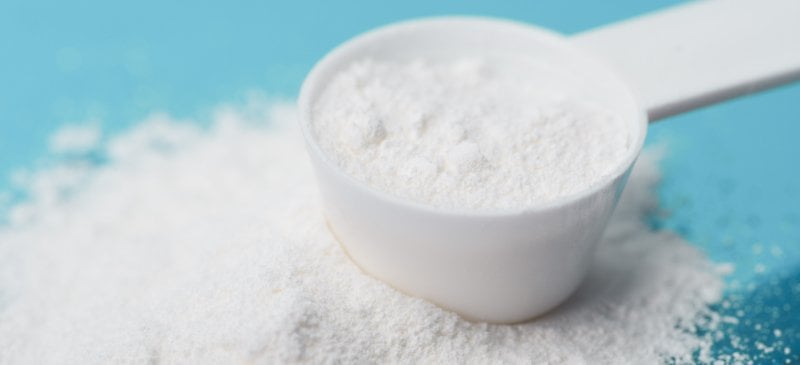Anyone who has practiced sport (especially power) will have heard of the creatine. This substance occupies one of the first three steps of the podium, in fact top selling sports supplements.
Many properties are attributed to it: from the improvement of endurance, to the increase of muscle mass up to the promotion of some cognitive functions. Before delving into them let's get to know this nutrient better.
Index
Formulation and characteristics
La Creatine is an amino acid that the body is able to produce independently through the synthesis of three other amino acids: glycine, arginine and methionine. This substance accumulates in muscle cells until it is released - during physical exertion - in the form of the energy.
Creatine is also present in certain foods, especially meat and fish, while it is contained only in trace amounts in plant foods. For this reason, in addition to sportsmen, even those who practice vegan and vegetarian diets can benefit from taking creatine supplements. A study published in the British Journal of Nutrition, has in fact highlighted how the integration with creatine has improved memory functions in vegetarians by as much as 40% (compared to the placebo group).
There are various creatine supplements on the market. The most appreciated and most documented formulation in the scientific literature is the creatine monohydrate. It is a well tolerated substance, with modest and infrequent side effects.
Creatine, what advantages
As anticipated at the beginning of the article, creatine offers many benefits to athletes, especially to crossfitters, powerlifters and body builders. The most marked action of this substance is in fact on high intensity and short duration exercises, which require power and force explosive. Used as an adjuvant in physical activity, creatine contributes to:
- increase our body's energy levels
- increase muscle mass and endurance
- repair damaged muscle tissues
- increase active testosterone
To achieve the above benefits, you must first "saturate" your muscles with adequate levels of creatine. It has been shown that to reach these levels they are necessary 0,04gr of creatine per kg of body weight per day (on average 3-6 gr) for two weeks, followed by a period of abstinence (on average one month).
According to a recent Research, best moment for creatine intake it's right after your workout. Ideally together with a smoothie or other drink that contains sugars and carbohydrates, as they seem promote the transport of creatine to the muscles.
Benton D, Donohoe R. Br J Nutrition 2011, "The influence of creatine supplementation on the cognitive functioning of vegetarians and omnivores." //www.ncbi.nlm.nih.gov/pubmed/21118604
Richard B. Kreider, Douglas S. Kalman, Jose Antonio, Tim N. Ziegenfuss, Robert Wildman, Rick Collins, Darren G. Candow, Susan M. Kleiner, Anthony L. Almada and Hector L. Lopez, 2017 International Society of Sports Nutrition position stand: safety and efficacy of creatine supplementation in exercise, sport, and medicine //jissn.biomedcentral.com/articles/10.1186/s12970-017-0173-z
Andy, WODprep, 2019 "The CrossFit Supplements Guide: What Science Actually Shows", //wodprep.com/blog/crossfit-supplements/ Accessed 16 April 2019
© photo @carlovittorio_video

